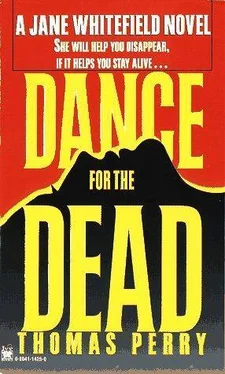Thomas Perry - Dance for the Dead
Здесь есть возможность читать онлайн «Thomas Perry - Dance for the Dead» весь текст электронной книги совершенно бесплатно (целиком полную версию без сокращений). В некоторых случаях можно слушать аудио, скачать через торрент в формате fb2 и присутствует краткое содержание. Жанр: Старинная литература, на английском языке. Описание произведения, (предисловие) а так же отзывы посетителей доступны на портале библиотеки ЛибКат.
- Название:Dance for the Dead
- Автор:
- Жанр:
- Год:неизвестен
- ISBN:нет данных
- Рейтинг книги:4 / 5. Голосов: 1
-
Избранное:Добавить в избранное
- Отзывы:
-
Ваша оценка:
- 80
- 1
- 2
- 3
- 4
- 5
Dance for the Dead: краткое содержание, описание и аннотация
Предлагаем к чтению аннотацию, описание, краткое содержание или предисловие (зависит от того, что написал сам автор книги «Dance for the Dead»). Если вы не нашли необходимую информацию о книге — напишите в комментариях, мы постараемся отыскать её.
Dance for the Dead — читать онлайн бесплатно полную книгу (весь текст) целиком
Ниже представлен текст книги, разбитый по страницам. Система сохранения места последней прочитанной страницы, позволяет с удобством читать онлайн бесплатно книгу «Dance for the Dead», без необходимости каждый раз заново искать на чём Вы остановились. Поставьте закладку, и сможете в любой момент перейти на страницу, на которой закончили чтение.
Интервал:
Закладка:
If he managed to plant himself so that he was impossible to ignore while she was out front mowing her lawn and ask her a question like, "What are you doing these days?" she would say in her friendliest way, "Mowing my lawn." Then she would flick the conversation out of his hands, fold it into a joke, and toss it back to him. "When I get done with this one I'm heading over to your house to do yours. You're turning that place into an eyesore and lowering property values from here to Buffalo."
It was around this time that Jake had begun to notice the visitors. Maybe they had been coming for a long time, and he hadn't noticed because he was still going to work every day. But there they were. The strangers would come to her front door. Some were women, but most of them were men. The door would open and they would disappear inside. Sometimes late at night he would hear a car engine and then they would be gone. A lot of the time Jane would be gone too, and not return for a month or more.
After a couple of years of this he pretended he didn't know where the boundary was between small talk and prying. He asked her where she was getting the money to live. She said she had a "consulting business." That pushed Jake four or five steps past the boundary and made him determined to find out what was going on. Various theories suggested themselves. She obviously had plenty of money that she wasn't prepared to account for in a way that might set anyone's mind at ease.
He had worried himself five years closer to the grave before he heard her burglar alarm go off one night. He rushed to his corner window and flipped the switch to turn on the porch light that he used so seldom he wasn't even sure the 250-watt bulb was good anymore. There, caught in the sudden glare, were not one or two but four men. The one nearest him reached into his coat and produced a pistol. It wasn't the standard revolver the Deganawida police carried. It was big and square like the .45 Colts they used to issue in the army. Jake still considered it a great piece of fortune that the man's second reaction to the light had been to turn his face and then his tail rather than to open fire.
After that night he had sat Jane down and demanded answers to the questions he had been asking less and less politely for years. The ones he got weren't the sort that would induce a reasonable person to sleep much better. A man who had the sort of enemies other people only dream about had managed to get himself tracked to her door, and the four of them had tried to break in to see if there was anything in there to help them learn where he was.
Now Jake took his bushel basket and dumped the leaves into the big barrel by the garage. This part of the country was different from other places because the Indians had never left. There were so many differences between groups - the English from Massachusetts who had fought here in the Revolution and seen how much better this land was; the Irish recruited from their bogs to dig the Erie Canal, supposedly because somebody figured they could survive the swamps but maybe because nobody cared if they didn't; the German farmers who arrived as soon as there was enough water in the ditch to float their belongings here on canal boats - that the Indians weren't much stranger to them than they were to each other. After that the rest of the world arrived.
The names of most places stayed pretty much whatever the Seneca had called them, and the roads were just improvements of the paths between them. The cities were built on the sites of Seneca villages beside rivers and lakes, plenty of them with Senecas still living in them, at first just a trading post and then a few more cabins, and then a mill.
Even now things that people thought of as regional attitudes and expressions came straight from the Senecas. When anybody from around here wanted to say they were still present at the end of a big party, they would say they had "stayed until the last dog was hung." Most of them probably had no idea anymore that they were talking about the Seneca New Year's celebration in the winter, where on the fifth day they used to strangle a white dog and hang it on a pole. Nobody had done that for at least a hundred years It was easy to forget about Indians as Indians or Poles as Poles most of the time, so people did, but whenever Jake got to the point where he was pretty sure everybody was just about the same, one of them did something that was absolutely incomprehensible unless you compared it with what her great-grandpa used to do.
8
Jane awoke suddenly in the darkness. Her hands could feel the stitched outlines of the flowers on the quilted bedspread her mother had made. She was puzzled. It took her a moment to remember why she was in Deganawida, sleeping fully dressed. She could tell that her mind had been struggling with something in the darkness, but whatever it was, she had not been able to bring it back with her this time. There was a sound still in the air, maybe left over from the dream, and then she heard it again: the ring of the doorbell.
She stepped to the window and looked down at the front steps. She could see the faint glow of the porch light on Carey McKinnon's high forehead. He was carrying a big brown shopping bag. She hurried to the mirror, turned on the light, brushed her hair quickly, then rushed into the bathroom and reached for the handle of her makeup drawer, but the ring came again. She had no time.
She came down the stairs, crossed the living room, and swung the door open. She stayed back out of the reach of the bright light on the porch and said, "Oh, too bad. I was hoping it was Special Delivery."
"No, you weren't," said Carey. "They don't come at eleven o'clock at night. I happened to be passing by on the way home from work, and I saw your car was back."
"No, you weren't," she said. "Deganawida is north of the hospital. Amherst is due east."
"I had to stop near here to buy myself these flowers." He opened the bag and held up a dozen white roses. "Since you're up anyway, could you do me a favor and put them someplace?"
"Oh, all right." She reached out and took them. "I suppose you'd better come in while I do it. I don't want you scaring Mrs. Oshinski's Dobermans."
He stepped in and closed the door behind him. She knew she had imagined he had ducked to come through the doorway; he had just looked down to plant his feet on the mat. But he had always given the impression that he was a big boy and still growing, and it had never gone away, ten years after college, when his sandy hair was already thinning a little at the crown.
He followed her into the kitchen. "So how was your trip?"
"Who said I was on a trip?"
"Oh. Then how did your car like its month in the shop?"
"I was on a trip," she conceded. "California. It's pretty much as advertised."
He nodded. "Warm."
"Yeah. What's a doctor doing coming home this late? House calls?"
"Dream on. I'm working the emergency room. Night is the time when roads get slippery, fevers go up, people clean loaded guns."
Jane snipped the stems of the roses and skillfully arranged them in a cloisonne vase that had been her grandmother's, then placed the vase on the dining room table.
"Beautiful," said Carey. "Good place for them, too."
"They're right where you won't forget them when you leave."
"No, you might as well keep them. They're all wet." He pretended to fold up his shopping bag. "Oh, I forgot. They gave me this too." He held up a bottle of champagne. "Two-for-one sale or something. I couldn't understand the lady in the store. Thick Polish accent."
"Your mother was Polish."
"Was she? I couldn't understand her either." He walked to the sink, popped the cork on the champagne, and plucked two glasses out of the cupboard. "Explains a lot. Maybe that's what she was trying to tell me. Nice woman, though."
Читать дальшеИнтервал:
Закладка:
Похожие книги на «Dance for the Dead»
Представляем Вашему вниманию похожие книги на «Dance for the Dead» списком для выбора. Мы отобрали схожую по названию и смыслу литературу в надежде предоставить читателям больше вариантов отыскать новые, интересные, ещё непрочитанные произведения.
Обсуждение, отзывы о книге «Dance for the Dead» и просто собственные мнения читателей. Оставьте ваши комментарии, напишите, что Вы думаете о произведении, его смысле или главных героях. Укажите что конкретно понравилось, а что нет, и почему Вы так считаете.












